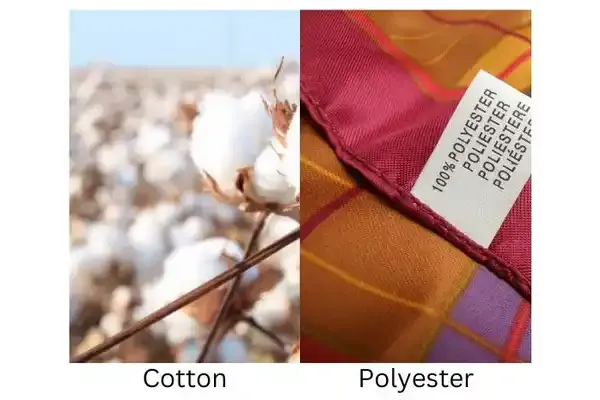Introduction
Cotton and polyester are two of the most commonly used fabrics in the textile industry, each offering unique characteristics and benefits. Understanding the differences between these materials is essential for making informed choices when selecting clothing or home textiles. In this article, we will explore the properties, comfort, durability, environmental impact, maintenance requirements, and cost considerations of cotton and polyester fabrics. By delving into the intricacies of these versatile textiles, readers will gain valuable insights into choosing the right fabric to suit their needs and preferences.
Cotton vs Polyester
i. Defining Cotton
Ah, cotton – the soft, fluffy fiber that feels like a cozy hug from your favorite t-shirt. It's a natural fiber made from the fluffy fibers surrounding the seeds of cotton plants. Cotton is breathable and known for its comfort factor.
ii. Exploring Polyester
Polyester, on the other hand, is like that friend who always looks put-together: it's a synthetic fiber made from petroleum-based substances. Polyester is durable and often used in blends to add stretch and wrinkle resistance to fabrics.
Composition and Properties of Cotton and Polyester
i. Comparison of Material Composition
Cotton is 100% natural, while polyester is 100% synthetic. Cotton wins the eco-friendly badge, but polyester takes the crown for its resilience against wrinkles and moisture.
ii. Understanding Fabric Properties
Cotton is breathable, soft, and great for sensitive skin, but it can shrink and wrinkle easily. Polyester is durable, quick-drying, and retains its shape well, but can trap heat and be less comfortable in hot climates.
iii. Comfort and Breathability
Cotton's Breathability and Comfort
Picture a cloud on a sunny day – that's cotton for you. It's breathable, moisture-wicking, and perfect for lounging around or basking in the summer breeze.
Polyester's Performance in Comfort
Polyester is like your reliable workout buddy – it wicks away sweat, dries quickly, and keeps you feeling fresh during intense activities. It may not be as cozy as cotton, but it's a winner in the performance department.
iv. Durability and Longevity
Cotton's Durability Characteristics
Cotton may be soft, but it's also a tough cookie. With proper care, cotton fabrics can last a long time and even get softer with each wash. Just watch out for those pesky wrinkles!
Polyester's Longevity Factors
Polyester is the marathon runner of the fabric world – it can withstand frequent washing, resist fading, and hold its shape well over time. It may not have cotton's natural charm, but it sure knows how to stick around.
Environmental Impact and Sustainability
i. Cotton's Eco-Friendly Aspects
When it comes to environmental impact, cotton is considered a more eco-friendly choice compared to polyester. Cotton is a natural fiber, biodegradable, and renewable. It is grown from the cotton plant, making it a sustainable option. Additionally, cotton production promotes biodiversity and supports local farming communities.
ii. Polyester's Environmental Impact
Polyester, on the other hand, is a synthetic fiber derived from petroleum-based products. The production of polyester involves a more significant carbon footprint and consumes non-renewable resources. Polyester fabrics are not biodegradable and can contribute to environmental microplastic pollution, especially during washing. When it comes to sustainability, polyester falls short compared to cotton.
Maintenance and Care Tips
i. Caring for Cotton Fabrics
Cotton fabrics are relatively easy to care for. They can typically be machine-washed and tumble-dried. However, to prevent shrinking, it's best to wash cotton in cold water and avoid high heat when drying. Cotton may wrinkle easily, so ironing or steaming may be necessary to maintain a crisp look.
ii. Tips for Maintaining Polyester Items
Polyester fabrics are known for their wrinkle resistance and durability. They can usually be machine-washed and dried, making them low-maintenance. However, avoid high heat when washing and drying polyester to prevent damage to the fibers. Polyester is less prone to shrinking compared to cotton, making it a convenient choice for busy lifestyles.
Cost Comparison
i. Evaluating the Price Points of Cotton
Cotton products tend to be more expensive than polyester due to the higher production costs associated with natural fibers. However, the durability and comfort of cotton often justify the higher price tag for many consumers. Investing in quality cotton items can lead to longer-lasting and more comfortable clothing and home textiles.
ii. Cost Considerations for Polyester Products
Polyester is typically more budget-friendly compared to cotton. The synthetic nature of polyester makes it a cost-effective choice for those on a budget. While polyester may not have the same luxurious feel as cotton, it offers durability and ease of care at a lower price point.
Choosing the Right Fabric for Your Needs
When deciding between cotton and polyester, consider your priorities. Cotton may be the better choice if sustainability and natural fibers are essential to you. For low-maintenance, budget-friendly options, polyester could be the way to go. Ultimately, choosing the right fabric for your needs depends on a balance of factors such as comfort, durability, environmental impact, and budget constraints.
Conclusion
The comparison between cotton vs polyester reveals a nuanced understanding of these fabrics' qualities and implications. Whether prioritizing comfort, sustainability, durability, or cost-efficiency, each material presents distinct advantages and considerations. By weighing these factors against personal preferences and practical needs, individuals can make informed decisions when selecting garments or household textiles. Ultimately, the choice between cotton and polyester hinges on a balance of factors that align with the desired qualities for a particular use case.










0 Comments